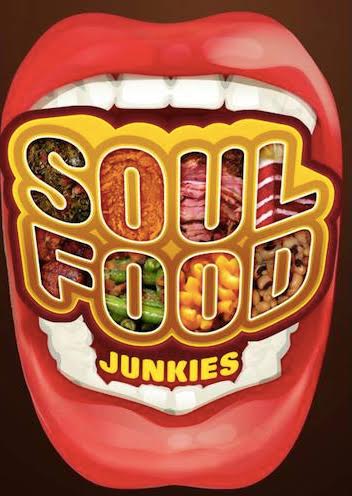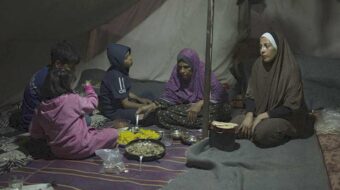
Recently Netflix, the international provider of on-demand internet streaming media, has added a variety of new programming to its options for subscribers. One of those new options is an independent documentary, produced by Byron Hurt, entitled Soul Food Junkies. The documentary deals with the question of eating habits within the African-American community and the often tumultuous relationship between healthy living and tradition. It is a documentary that deserves a look at not only for how well done it is, but also the larger question it raises of how, even food, is not only personal, but political, given who has access to healthy options.
Within this documentary Hurt, an American activist, lecturer, writer, and award-winning documentary filmmaker, explores the origins of soul food, the cuisine often associated with black people who live in the southern region of the United States of America, its impact on the health of African Americans, and whether or not black people, as a community, are “soul food junkies”. Although the documentary begins as one gearing towards the exploration of soul food, it soon takes a poignant turn in serving as a jumping off point to the larger conversation of the industrialization of the food industry, and its impact on proper food access to working class communities that are predominately African-American.
Hurt’s incentive behind making the documentary is the loss of his father to pancreatic cancer. Hurt wonders if his father, a man who loved to eat enormous amounts of soul food all his life, fell victim to the health problems that unhealthy eating can generate. Hurt believes his father was addicted to soul food, and just like his father fell ill, Hurt believes many within the black community continue to fall victim to same health problems that an unhealthy diet can create.
Soul Food is a modern term associated with cuisine that originated during the era of slavery in the United States. It consists of meals created by African Americans who were enslaved during this era, who were often given the scraps of food left over from their slave masters. From these scraps, and other materials harvested by the enslaved Africans, a variety of colorful, unique, and delicious meals were created. Hurt speaks to a variety of historians and activists to expound on the origins of soul food and how it’s able to still resonate in the black community today. He learns that the term soul food actually originated during the mid-1960s Black Power movement as a way to identify such a staple of black culture. Through the variety of interviews Hurt gets a sense that this kind of food was seen as a source of pride within the black community, yet, as the documentary continues, it has become evident to Hurt that what constitutes as soul food, (often meat based with high fat content), could also be seen as one of the detriments to health for many within this community. These detriments include a number of ailments such as high blood pressure, diabetes and obesity.
As StateofObesity.org found in their special report Racial and Ethnic Disparities in Obesity, “African American adults are nearly 1.5 times as likely to be obese compared with White adults. Approximately 47.8 percent of African Americans are obese (including 37.1 percent of men and 56.6 percent of women) compared with 32.6 percent of Whites (including 32.4 percent of men and 32.8 percent of women).”
When looking at facts similar to the one just mentioned, Hurt explains that it can be easy to point the finger towards soul food alone when it comes to the health issues blacks face, and concluding that it is individual choices to eat unhealthy forms of traditional food that has created the so called obesity epidemic within the black community. Yet, Hurt goes on to interview a variety of activists who point to other, more systemic, factors that come into play.
Food justice advocate and author of “Vegan Soul Kitchen,” Bryant Terry, explains that people need to, “complicate their understanding of soul food,” and that it would be easy to say that soul food is the bane of African American health, but that the “bigger issue is the industrialization of our food system,” and how this happened four to five decades ago. Terry asserts that corporations are in the habit of making mass produced fast and cheap foods, with adverse health results for those that consume them.
Dr. Marc Lamont Hill, who is a professor and author, brings up the term “food deserts”. Food deserts is a term to refer to parts of the country that lack fresh fruit, vegetables and other healthy whole foods. These food deserts are often in impoverished areas. Hill explains that many of these food deserts are populated by African Americans, and that this lack of access to healthy food has been normalized in the United States. Hill states that there is, “no better example of racism in the 21st century than the relationship between black people and access to healthy foods… You want a 21st century genocide, all you have to do is keep doing what we’re doing and deprive people of access to healthy food.”
As the Racial and Ethnic Disparities in Obesity report explains, “Lower-incomes and poverty correlate strongly with an increase in obesity, since less nutritious, calorie-dense foods are often less expensive than healthier foods. African-American families have earned $1 for every $2 earned by White families for the past 30 years.”
Hurt’s film goes on to show ways in which those in impoverished communities are attempting to lead healthier lifestyles by growing their own food, along with advocating for better access to higher quality supermarkets. The film shows that healthy living isn’t just an individual choice, but is affected by the very system under which we live.
The documentary can currently be found on Netflix, and will re-air on PBS on Monday, December 7, 2015.
Soul Food Junkies
Director: Byron Hurt
Writer: Byron Hurt
Runtime: 64 min

MOST POPULAR TODAY

Zionist organizations leading campaign to stop ceasefire resolutions in D.C. area


High Court essentially bans demonstrations, freedom of assembly in Deep South

Afghanistan’s socialist years: The promising future killed off by U.S. imperialism

Communist Karol Cariola elected president of Chile’s legislature






Comments